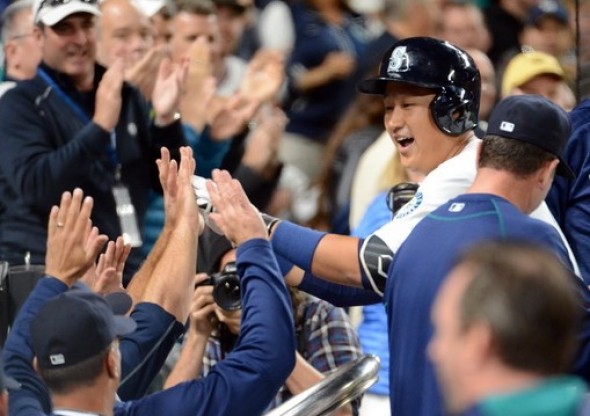
In a Mariners offseason filled with maneuvers that would have left Machiavelli’s head spinning, no single announcement raised more eyebrows than the signing of South Korean superstar Dae-Ho Lee to a minor league contract. Midway through the season, the decision has paid off for GM Jerry Dipoto and manager Scott Servais: Lee beat long odds to make an impact in the majors as a 33-year-old rookie.
Servais said the decision to invite Lee came from the “what if” approach the Mariners adopted in their attempt to end the longest playoff drought in MLB.
“Did I think he’d have 10 home runs and 30 RBIs by July first?” Servais said last week. “Probably not, to be honest. What intrigued us was the unknown. This guy, if he clicked . . . what could he be to our club?”
If it were anything similar to his four years in Japan’s Nippon Professional Baseball League, or the decade prior, in the KBO League in Lee’s native South Korea, the answer would be: Offensive cornerstone.
Lee’s numbers were impressive. Playing for the Fukuoka SoftBank Hawks in 2015, he finished with 31 home runs and 98 RBIs, to go with a .524 slugging percentage in 141 games. He was MVP of the Japan Series, as the Hawks finished off the Tokyo Yakult Swallows in five games to claim their second consecutive championship.
When he was invited to camp in early February, some believed Lee’s numbers wouldn’t hold up in the majors, despite the NPB’s tougher pitching than the KBO, where Lee spent the first 10 years of his pro career. Then there was Lee’s weight. At six-foot-four and billed at 287, it seemed that the invite should have come from Seahawks line coach Tom Cable rather than Servais.
Despite the questions, Lee wasn’t an unknown entity. His Japanese team had trained in Peoria, AZ., during the winter. Most of Seattle’s coaching staff had a chance to see Lee play before the invitation was extended. He impressed with his nimbleness around first base for such a big guy.
Still, the offer was scaled to the odds for success of a 33-year-old rookie. Lee was guaranteed $1 million if he made the opening day roster, with up to $3 million more in incentives.
That was the deal: A shot to play in MLB, and a best-case scenario that still fell short of the 500 million yen (about $4.9 million) the Hawks guaranteed Lee if he stayed in Japan. It was the contract equivalent of a shrug.
“What if?”
Lee took off for Arizona, arrived early, and immediately went to work, dropping, it was said, 40 pounds in time for camp.
Lee impressed enough to make the 40-man roster in a platoon spot with Adam Lind at first base, as well as backing up at DH. He turned heads April 8 when he smashed his first hit in the majors over Safeco Field’s center field wall for the first of his 11 home runs — the seventh player in club history whose first MLB career hit was a dinger.
As big as Lee’s bat has been, Servais said that the Korean’s clubhouse presence is a big part of the team’s cohesion.
“He’s a big personality,” Servais said. “He means a lot to our clubhouse and his teammates. It’s a personality thing. I think he’s fit in very easily. He has fun, he laughs at himself. If you can’t do that, it’s an issue. He has a lot of fun with the guys. They appreciate him, they also respect him because he’s a good player.”
According to Robinson Canó, Lee’s sense of humor, whether through his interpreter or through antics, has allowed him to grow close, despite the language barrier.
“Even though I can’t speak English, I can say ‘Hi, how are you?’” Lee said through an interpreter. “I can understand that much. I’ve gotten to know everyone the past four months, and everyone is very nice.”
Still, Servais said that a winning personality with a losing bat wouldn’t last long in a clubhouse. Lee has stood up to the requirements.
In Wednesday night’s game in Houston, Lee hit his 12th home run but struck out with the bases loaded in the ninth that allowed the Astros a 9-8 win. He’s hitting .291 with an OPS of .850 and 37 RBIs in 172 at-bats. He ended last week as the American League’s top pinch hitter (6×17, .353) with seven PH RBIs, second in the AL. April 13 against Texas, he hit the third pinch-hit, walk-off homer in club history.
Lee’s contract is for a single season. It will take a similar production on the back end of the All-Star break to stay in the major leagues. He’s no All-Star, but Lee, who turned 34 in June, proved that he is an All-What-If guy, a rare experience for Mariners fans used to a club whose reach so often exceeds its grasp.

4 Comments
He is a streaky hitter and he might have twice of current numbers if he plays everyday. Don’t say he is no all star. He just never got the chance to be one since we have another supposedly good 1bm :P
<<o. ✸✸✸✸✸:✸✸✸✸✸:✸✸✸✸✸:✸✸✸✸✸:✸✸✸✸✸:✸✸✸✸✸:✸✸✸✸✸:✸✸✸✸✸:✸✸✸✸✸:✸✸✸✸✸:::::::!uf231w:….,……
As mentioned in the article, Lee took multi-million dollar paycut to have a shot at MLB. In this age of show-me-the-money, he demonstrated his character. Lee has been a winner of batting average, RBI, HR, golden glove award for many years in Korean and Japan professional league.
Big question was whether he could produce the same in the Majors. Well, now his numbers speak for themselves with Lee being a serious contender for Rookie of the Year. I hope that his success continues and that Lee helps Mariners to the playoff this year.
<<o. ✸✸✸✸✸:✸✸✸✸✸:✸✸✸✸✸:✸✸✸✸✸:✸✸✸✸✸:✸✸✸✸✸:✸✸✸✸✸:✸✸✸✸✸:✸✸✸✸✸:✸✸✸✸✸:::::::!uf115w:….,…..